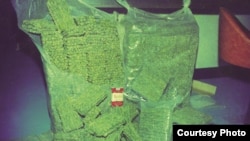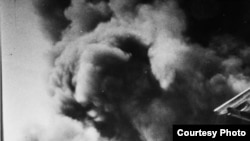[Editor’s Note: In the 1970s, Thai Stick was renowned among smugglers, and was almost a brand name to consumers. The story of Thai Stick, the name given to a strain of the narcotic marijuana transported from Southeast Asia to the United States, was little known until historian Peter Maguire and former smuggler Mike Ritter, both Americans, decided to investigate. For their book, “Thai Stick: Surfers, Scammers, and the Untold Story of the Marijuana Trade,” they interviewed international smugglers, law enforcement agents, Thai pirates and police officials. The detailed history is now being made into a television series and documentary. In addition, Maguire and Ritter are working on their second book, which focuses on the American criminal justice system and the War on Drugs. Maguire spoke about these projects at length recently with VOA Khmer’s Soksreinith Ten.]
How did you become interested in the 1970s Thai marijuana industry?
Well, I grew up in Southern California, and there were a number of people from even my hometown that were involved in marijuana smuggling from Thailand. It was a very big industry in California in the coastal towns in the 1970s and ’80s. So I knew quite a bit about it. And then when I first went to Cambodia in the early ’90s and when investigating Toul Sleng prison, I found the confessions of four Americans who were captured and killed by the Khmer Rouge, and I knew immediately that they were marijuana smugglers. I didn’t know. They didn’t admit it. I just sensed that that was the case. So I began to contact people from my hometown that I grew up with, to ask around if anybody knew them and was introduced to a man named Mike Ritter, who would go on to be the co-author of my book, Thai Stick, with me. He had been a smuggler in Thailand, who worked with Thai pirates and who would bring marijuana out to the American ships in international waters. It turned out that that one of the two boats of Americans had contacted him in Thailand in 1978, to supply that marijuana. So that’s really how the story began.
How did you come up with the idea of writing the book about it?
I worked on this book for about 15 years. We probably have over 1,000 hours of interviews with smugglers, DEA [the U.S. Drug Enforcement Agency], Thai pirates, Thai power brokers, the Khmer Rouge. So it was a very fascinating project to me as a historian, recording a history of something that there really was no history of. It was not like I could go to the library and read much about marijuana smugglers from the actual smugglers themselves. Really, the only accounts are from the law enforcement side. So as a historian, it was a fascinating experience. It took probably seven years longer than it should have, because, in I think about 2003…my co-author was arrested for the smuggling that he had done in the 1980s, and he eventually went to prison for a year and a half. So while that was all going on, I had to let his legal situation resolve itself before I could finish the book.
How different was “Thai stick” from other marijuana available at that time?
It was probably the best marijuana in the world. It was grown in [the Thai province of] Isan. It was grown both in Laos and Thailand. It was very, very particular to that region. It had to do with the climate. It had to do with the soil. It had to do with the cultivation technique that we suspect came down from China. Before the Americans, before the Westerners, before anybody came to help them with the technical side of growing, the Lao and Thais were incredibly sophisticated. They really knew what they’re doing.
Who started this industry for smuggling marijuana, which not only went to the U.S. but also to Europe, South Africa and Australia?
Initially, it begins very innocently. The first smugglers, more often than not, are sailors who are sailing around the world on their small private yachts. And it was very, very easy for someone to sail a load of Thai marijuana, say, from Bali down to northwest Australia. That was the first real smuggling line. The marijuana would go from Thailand to Bali, and then it would sail from Bali to Australia. But then as the demand grows and the price, and the value, and everybody sees how much people are making, more professional people get involved. Ironically, as law enforcement is more successful in arresting these sailors and these kinds of amateur smugglers, the real criminals and gangsters take over the industry. So that by the late 1980s when the Thai marijuana industry is really killed, you had all sort of people involved from mafia to mercenaries to American government agents. So it becomes very, very corrupt towards the end, and very, very large scale.
You mentioned that you have talked to many people—international smugglers, Thai police, former Khmer Rouge cadres and others. How did you trace down these people? And how willing were they to talk to you?
It was an interesting process. Some of the Khmer Rouge guys I spoke with were also involved in the [U.S.-flagged ship] Mayaguez affair and they were under the command of [Khmer Rouge navy commander] Meas Muth. So they were nervous about getting dragged into the Khmer Rouge trial. Some of those interviews were a little bit tense.
The smugglers and the DEA agents who busted them, oftentimes it was hard to get them to start talking. But once they began to start talking, it was often very hard to get them to stop talking. Because they have kept this part of their life—and in many cases the most exciting part of their life—secret, up until this point. So there was a lot of trust involved because my co-author had been a smuggler. That opened many doors. I had some access to different people as well on the law enforcement and intelligence side from work I’ve done investigating the Khmer Rouge. So it was a good marriage between my co-author and I. We both had access to different communities that the other author didn’t have. And I think in the end it balanced the book out, more so than it would have been if I’d just written it or my co-author had just written it.
It was exciting to learn that the surfer Kelly Slater is making your book into documentary and TV series. Do you think these productions will do justice to your research?
Kelly Slater is an old friend. He bought the rights to the book roughly a-year-and-a-half or two years ago. He just simply loved the book and found it very entertaining—about a world that he grew up in, but he didn’t know as much about as he had thought. So at that point, we began talking to many, many different studios and had variety of offers. And in the end, SONY was the one who bought it. Really, the television show, it will be theirs—if they want my help, they’ll get it, but I don’t really have any illusions about becoming a screenwriter in Hollywood. I don’t really want to do that. So that project, I wish them the best. You know, I grew up in California, I know the film industry. Ultimately, they’re going to take my material, they’ll do what they want with it. They bought it. They have the right to do that.
The project that’s more interesting to me is the documentary because this is a history that needs to be told and it is very important for America today because the United States—and not just the United States, I would say much of the world—has a very, very twisted relationship with drugs. And today in America we have more people dying from pharmaceutical pills proscribed by doctors, than all illegal drugs combined. We have the largest prison population in the world. We have a judicial system that’s completely broken because of the War on Drugs. So these are some of the things I want to look into in the documentary. My co-author and I have been working with two extremely talented young documentary filmmakers—Kevin Klauber and Jeff Miller—and we’re really trying to maintain some control of this project because we have a number of studios and television networks very interested in it, but they want to put their fingerprints on it. They want tell us what we need to say or how this needs to be portrayed. And we don’t want to do that. We know these materials better than anyone out there. And we want the right to tell the story the way we want to tell it.
What did you aim to achieve by writing it Thai Stick? Does it have a moral?
There definitely is. And that is: Good intentions don’t always yield good results, and, oftentimes, by solving one problem, you create a larger problem.… In the case of drugs, we had marijuana very successfully eradicated in Thailand. We had it very successfully eradicated in Hawaii. And what happened in those two places? It was replaced with yaba and methamphetamine, two of the worst drugs ever put on the face of the earth. So because drug users couldn’t get marijuana, they started smoking yaba instead, which is a much more dangerous drug. And so it’s a story of what’s called pyrrhic victories, where you win the battle, but you lose the war. So that’s the moral really of the book.
You are now working on another book with Mike Ritter. How will this book be different from the first?
The second book will be very different. The second book will be much more about the American criminal justice system, and how it gets perverted by the War on Drugs, and how, oftentimes, the most guilty people do far less time in prison than people that are much lower than them, because they are not as smart or they don’t have as good a lawyer, or they don’t understand how to play the game of the criminal justice system. For example, one of the last big loads that got captured in the late ’80s is over 100 tons of Laotian marijuana. It’s carried over on two different boats and they are arrested and brought into Seattle. The sentences of those people—the people that cooperated with the government did very, very little time. The people that wanted their constitutional rights as Americans and to have a fair trial were punished for choosing a fair trial, and punished for not cooperating with the government. Basically, what the government begins to do by the end of the War on Drugs is they say: “If you want to go to trial, then we’ll go for a life sentence. If you take a plea bargain and you tell us everybody who you worked with, then maybe you’ll get five years.” There was so much power put in the hand of the prosecutors, and taken away from the judge.







